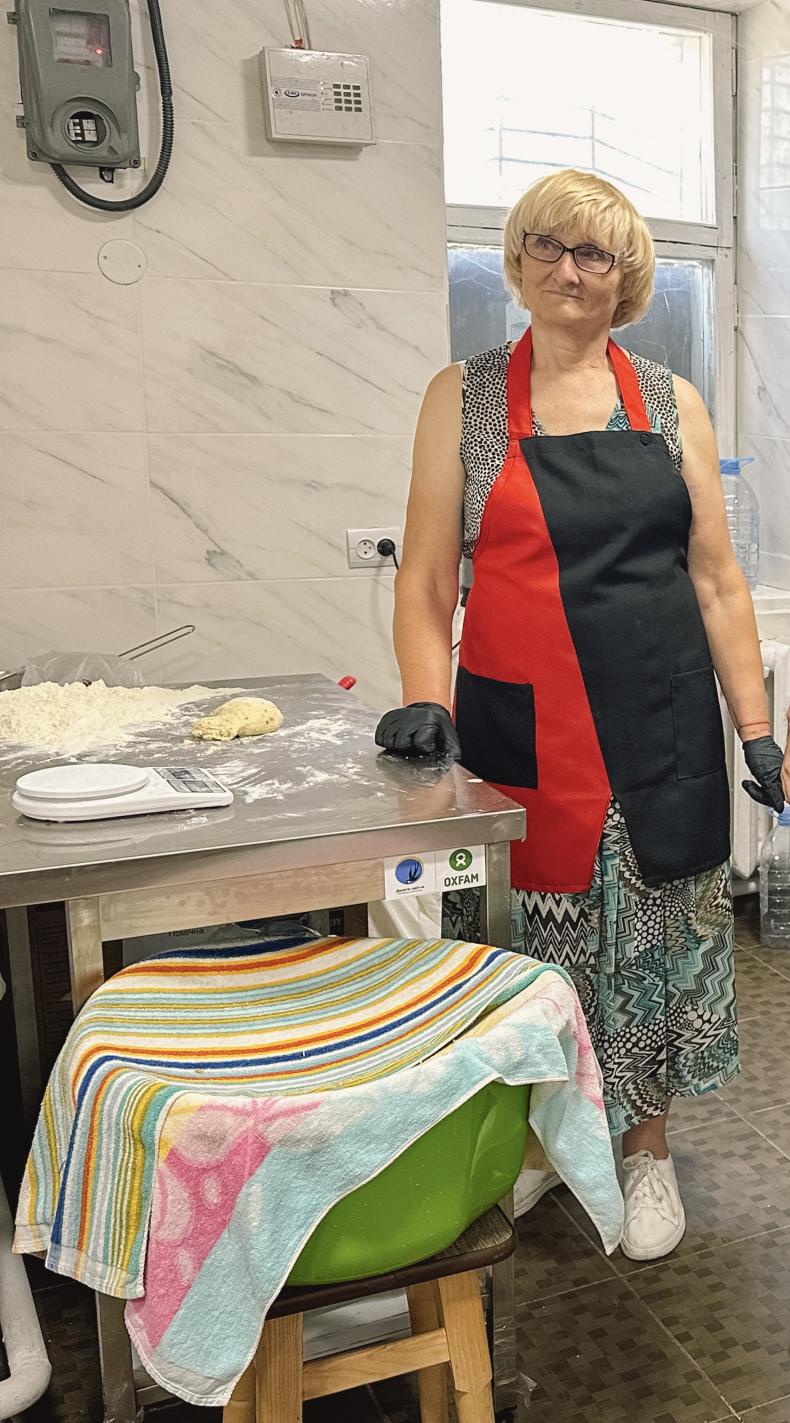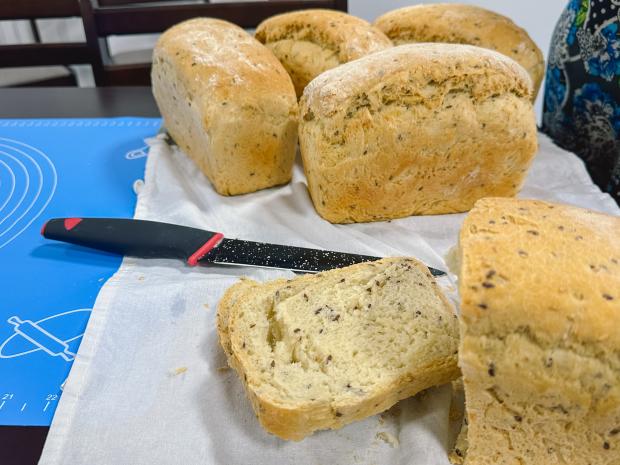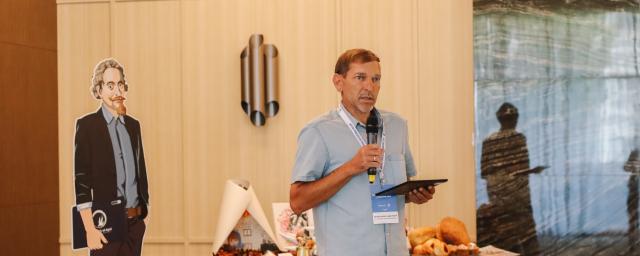
Oleksandr sharing the results of the shelter reconstruction during the forum organized by The Tenth of April in July. Photo provided by The Tenth of April
In Ukraine’s frontline regions, life is unpredictable. Military attacks reach residential areas, making everyday life tense and often very dangerous. In July, Ukraine saw its deadliest month for civilians in the past three years. During intense periods, people have to move carefully from one safe space to another, never knowing when danger might strike.
Amid this uncertainty, humanitarian activists are creating small islands of normalcy and warmth. They make places where people can take a moment to breathe and not worry about their safety and the safety of their children. Nelli, Oleksandr, and Nataliia are doing just that, each in their own way, bringing comfort to communities living through more than three and a half years of constant fear.
Story of Nelli, Whose Town Welcomed First Evacuees
Nelli, a 70-year-old activist from Pomichna, a small town in southern Ukraine, is fairly new to the humanitarian sector. Just a few years ago, she applied for a leadership training in Kyiv, which inspired her to create her own CSO. “At that time, I realized that no matter how old I am, I can do humanitarian work, and it can even be quite fruitful,” says Nelli.
In her town, this work was truly needed. Pomichna, whose symbolic name translates as “Helping” in Ukrainian, was among the first to receive evacuation trains from the Donetsk region, where some of the heaviest fighting was taking place. Today, out of Pomichna’s 10,000 residents, around 20% are internally displaced people (IDPs) fleeing shelling and occupation.
Wanting to make life in the town easier for them, Nelli, who was already running craft and handmade projects, applied for a grant from Oxfam’s local partner, The Tenth of April, with the idea of a social bakery. The bread they bake would go to IDPs, as well as large families and the elderly. Partners helped Nelli’s organisation buy ovens, refrigerators, kitchen hoods, and furniture, and the team started making bread.
“You’d think few people are in need of bread, but you would be surprised,” says Nelli. “When we started our bakery and decided to hand out bread to people, we discovered that so many can’t afford it. There’s a veteran in our town who got sick. It’s hard for him to work, and he just gets a couple of hundred hryvnias (less than $50) a month in social support. So, he comes in, helps us, and gets bread in return. There are IDPs who lost their identification documents; they also come in and help. Elderly people sometimes cry when they get our bread.”
But these are not just ordinary baked goods; Nelli’s bakery is trying to revive the long-lost recipe of Pomichnianskyi bread, which was once famous far beyond the borders of the town.
“People from all over the region used to come to Pomichna for this bread. When we started baking and handing it out, one of the older residents said they never expected to taste it again,” Nelli recalls.
The bakery has since become a “studio” where Nelli and her team teach locals to bake Pomichnianskyi bread, hoping to bring the tradition back to life. There are master classes for children, and more than 100 have already learned to bake. Nelli’s studio bakery has become a meeting place for their parents and new community members. They come not just to bake, but to talk, laugh, and feel the warmth of support in their new home, Pomichna.
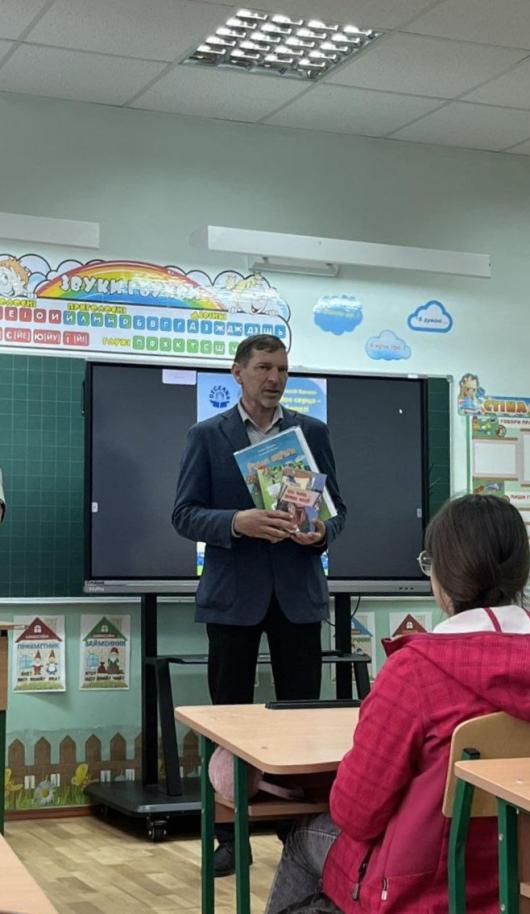
Oleksandr talking to the children at his school. Photo courtesy of Oleksandr
Story of Oleksandr, Whose School Became the Village’s Only Shelter
Oleksandr is the Principal of the only school in Tryhaty, a small village of about 1,200 people in Mykolaiv Oblast, which borders on the front line. The village has been hit by repeated shelling, a reminder of the nearby fighting.
The school houses Tryhaty’s only shelter, but until three months ago, it wasn’t suitable to provide real safety. Damp and bare-walled, the basement couldn’t protect 105 children during air alerts that sometimes lasted for hours. That’s why, from the beginning of the full-scale invasion in 2022, all learning took place online to keep everyone safe.
The same was true for the local kindergarten, also the only one in the village: it has stood empty since 2022, leaving many children without the early years of play and interaction. A lot of them entered first grade with serious socialization challenges and, in many cases, speech difficulties.
"The children couldn’t speak properly!" Oleksandr says. "Even before the full-scale invasion, many young kids had speech impairments, but the stress of the war and lack of socialization made things worse. It’s a big problem in primary school. Our school doesn’t have a speech therapist or defectologist, and there’s no space for visiting specialists to work, so we decided to create one."
The Tenth of April helped Oleksandr buy furniture, develop a budget, and provided support throughout the project. A 144-square-meter space was transformed into classrooms, where all students can continue learning even during air alerts. After school, children with speech impairments can come here to socialize and attend therapy sessions.
Oleksandr says they are putting the finishing touches on the furniture and look forward to welcoming children in September for a fresh start. In the new semester, they also plan to use these spaces as “quiet rooms” for children with anxiety. Oleksandr hopes to make learning less stressful for his students and turn the school into a space where every child can express themselves freely and without difficulty.
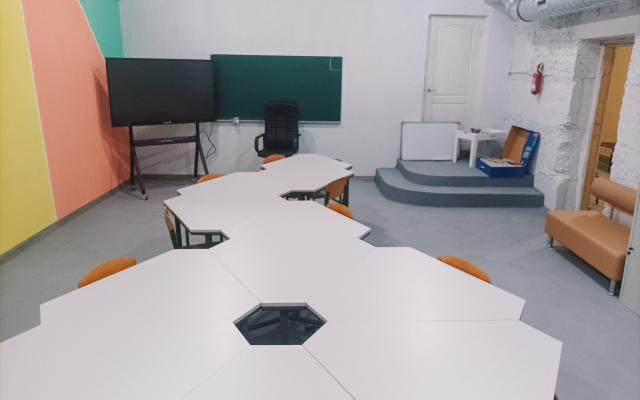
One of the classrooms in the newly reconstructed shelter. Photo courtesy of The Tenth of April.
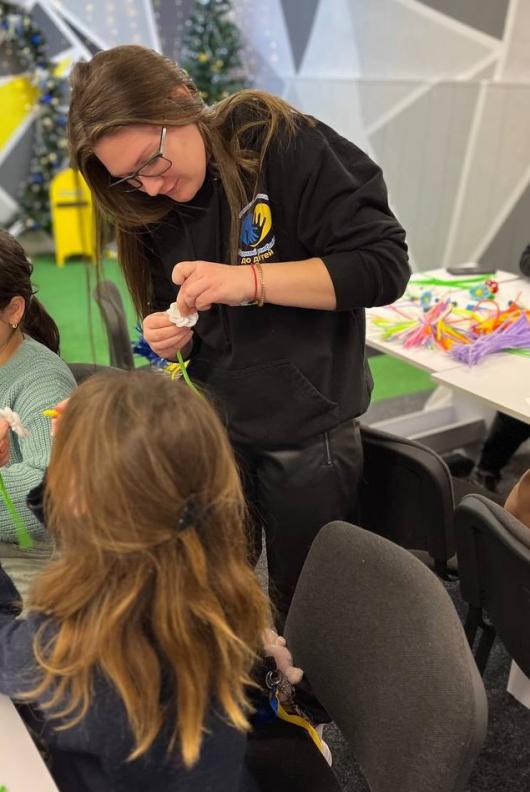
Nataliia helping children during a master class at "Meeting Place." Photo courtesy of United With Love to Children
Story of Nataliia, Whose City Rarely Sees Children in the Streets
“Everything we have in Kherson is online; there’s nothing going on offline,” says Nataliia Vashchenko, a 30-year-old activist who stayed in her native city through the nine-month occupation in 2022. Two years after the city came back under Ukrainian control, Kherson is not safe. The frontline is only 20 km south of the city.
“You won’t see kids in the playgrounds, they usually aren’t allowed to go outside,” she explains. Just a month ago, a one-year-old boy, Dmytro, died in a drone attack as he played in his grandmother’s yard in Pravdyne village, near Kherson. Drones are often spotted “hunting” people at bus stops and in cars.
Still, around 70,000 people stay in Kherson, including 5,200 children. “A lot of small children don’t even remember life before the war,” Nataliia says. “It’s not their choice to stay in such a dangerous city; that’s why we want them to capture at least a bit of a normal childhood.” Since daily life was pushed underground into basements and shelters, she knew that children needed somewhere safe to play, learn, and simply be children.
Together with her colleague Iryna, Nataliia co-founded the CSO “United by Love to Children.” They transformed a 15x5-metre basement in Kherson into a space called “Meeting Place” — a warm, welcoming environment where children can run, play, and take part in creative and educational activities. Here, children and their parents do sports, dance, attend concerts, and join community events. In its first year, “Meeting Place” welcomed 2,500 visitors and hosted 629 activities, and the number of people is just growing.
Over time, it has also become a hub for community engagement. The team organizes forums where young people can speak directly with local authorities, and where residents can discuss ideas, share concerns, and just connect.
For Nataliia, it is a place where children can experience the joy and freedom that war has taken from them, and where the community can come together to imagine a safer future.
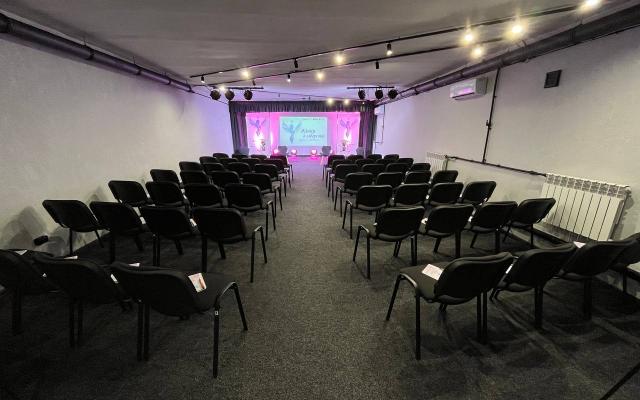
Meeting place". Photo courtesy of United With Love to Children
